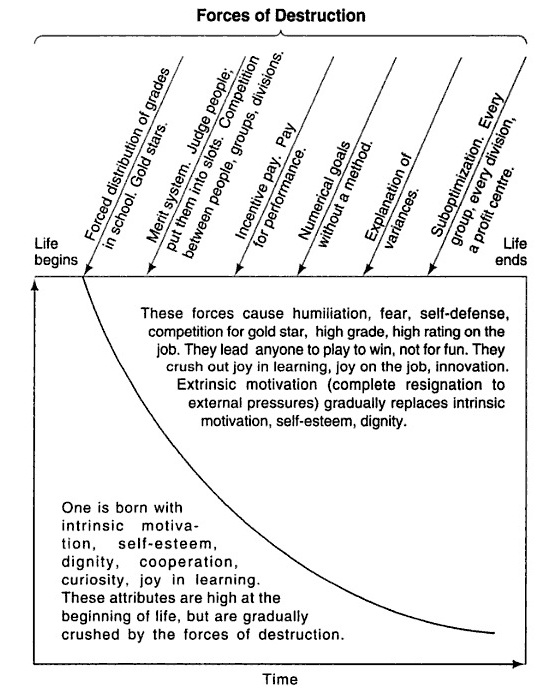Deming in the 1930s, 40s, 50s, 60s & 70s: same man, same thinking, different desks
It is easy to expect that when we work with change that this should mean ‘new’, whereas it should really mean ‘better’ or (if circumstances move the goalposts) ‘different’. The path of management learning over the past 40 years is littered with passing fads which have only delivered disappointment, but a few ideas outlast the comings-and-goings of gurus, trends and fads.
I am staggered to recall that it was 25 years ago that I first encountered the work of Dr W Edwards Deming whilst I sat in an undergraduate management lecture in the late 1980s. I have had the opportunity over the intervening decades to apply, test, avoid, seek alternatives or attempt enhancements to Deming’s ideas (and many other management thinkers). Some of my work has been in small departments, others in very large organisations; some commercial, others not. My thinking has emerged from a growth in understanding.
Deming, born in 1900, was an active communicator, teacher and consultant well into his 90s.

His seminars and lecture tours were still in demand from international audiences until his death 20 years ago this month, in December 1993, a couple of weeks after I passed my PhD viva. Deming continues to get a good hearing based on his books written over 30 years ago.
A freshly edited book which pulls together his collected papers was published in 2013. His illustration (Figure 1) of how a person’s motivation withers over their lifetime under “forces of destructive management thinking” rings as true today as in previous decades. Deming’s books draw on his teaching conducted over 60 years ago in Japan, ideas which arose from concepts developed by his professional mentor Walter Shewhart at Bell Laboratories over 80 years ago.
Shewhart’s own book published in 1931 is a classic, (its style perhaps less accessible to present-day readers). The observations and principles identified by Shewhart and Deming early in the 20th Century still stand up to scrutiny and practice. Their centenary approaches…
… much more than can be said for many management ideas since.
Further reading:
Deming W.E. (1982) Out of the Crisis, MIT CAES, Cambridge MA.
Deming W.E. (1994) The New Economics for Industry, Government, Education, 2nd Ed , MIT CAES, Cambridge, MA.
Deming W.E. (2013) The Essential Deming: leadership principles from the father of quality, Ed J. N. Orsini, McGraw-Hill, NY
Shewhart, W. (1931) Economic control of quality of manufactured product. Van Nostrand Company, New York.

